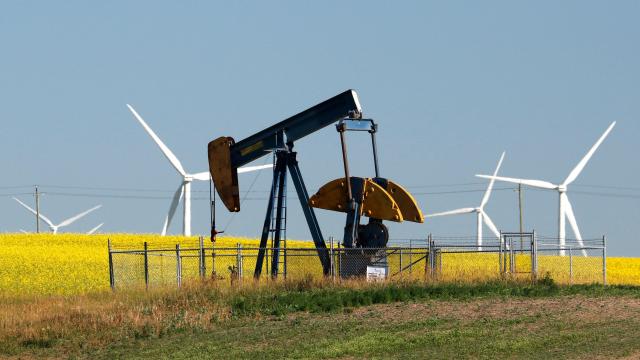In the world of climate change, we’ll take all the good news we can get. The energy crisis kicked off by Russia’s invasion of Ukraine earlier this year could represent a “historic turning point” for ending the world’s reliance on fossil fuels, the world’s top energy agency said this week.
A report from the International Energy Agency issued Thursday finds that global fossil fuel use could peak in the next few years following aggressive investments in clean energy during the crisis this year. This 2022 edition of the World Energy Outlook, as the IEA’s annual report is known, grapples with the enormous consequences of and fallout from Russia’s invasion of Ukraine in March.
The war in Europe, which kicked off amid already-high oil prices, cut off a major supply of Russian natural gas to Europe and has had real consequences on gas prices and overall energy prices around the world. As the first winter for Europe without Russian gas supplies approaches, world powers are scrambling to find alternative sources of energy. Fossil fuel majors including the U.S. have been expanding production to make up for the shortfall, leading some analysts to speculate that the war could increase reliance on gas and oil as more drilling infrastructure is created.
But over the long term, the IEA predicts, the crisis may prove to be the kick in the pants the world needs to wean itself off dirty energy. The IEA report predicts that global carbon emissions are on track to peak in 2025, thanks to huge government investments in green energy following the invasion.
“The environmental case for clean energy needed no reinforcement,” IEA Executive Director Fatih Birol said in a statement. “But the economic arguments in favour of cost-competitive and affordable clean technologies are now stronger – and so too is the energy security case. Today’s alignment of economic, climate and security priorities has already started to move the dial towards a better outcome for the world’s people and for the planet.”
The IEA report looks at energy use out to 2050 and how it’s predicted to shift; the phaseout will affect different forms of fossil fuels in various ways. Coal will be the first to go, with demand expected to decrease over the next few years. Demand for natural gas, the IEA predicts, will plateau by the end of the 2020s, while oil demand will flatten in the mid 2030s, thanks in large part to the coming boom in electric vehicles.
Oil and gas interests and their allies, especially in the U.S., have falsely attempted to blame high energy prices partially on climate policies. But the IEA’s analysis found “scant evidence” to support claims from the right that climate policies were in any way responsible for high energy prices, instead documenting how increased renewable use in some regions has led to lower electricity prices and how other changes, like efficient homes, can help offset high prices. (The buffer these changes provide, the report notes, is “far from enough” for many of the world’s poorest, who are suffering the most from the increased costs of energy.)
The news isn’t all rosy. Even with the rapid and aggressive changes being made due to the crisis, the IEA said, the shift away from fossil fuels is happening far too slowly. The IEA found that, even with fossil fuel use peaking in 2025 and nations implementing more aggressive shifts to renewables, the world is still on track to warm 2.5 degrees Celsius by 2100, figures that are roughly in line with separate findings released this week from the United Nations.
“It’s notable that many of these new clean energy targets aren’t being put in place solely for climate change reasons,” Birol told the New York Times in an interview. “Increasingly, the big drivers are energy security as well as industrial policy — a lot of countries want to be at the leading edge of the energy industries of the future.”
